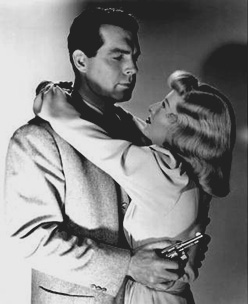Recommended Reads: Double Indemnity
Steven Powell is writing a PhD dissertation on James Ellroy at the University of Liverpool.
 Double Indemnity is one of the most important and influential of all American crime novels. Even so, as the reputation of its author, James M. Cain has declined, and as the film adaptation has surpassed the source material in fame, few people are actually aware of the novel’s significance. The story was first serialised in the magazine Liberty in 1936. Walter Huff (Walter Neff in the famous film) is a middle-aged, world-weary insurance salesman. Frustrated that his life has never risen above mediocrity, Huff soon finds himself enthralled by Phyllis Nirdlinger, the sexy young wife of a wealthy client. It is not long before the two begin a dangerous affair, which may appear to be dreadful cliché, and, indeed, it is not difficult to guess the next plot development. The pair devise a complicated scheme to murder her husband and fake his death as a suicide, since in the case of a suicide, a bureaucratic loophole would allow them to claim double on his life insurance.
Double Indemnity is one of the most important and influential of all American crime novels. Even so, as the reputation of its author, James M. Cain has declined, and as the film adaptation has surpassed the source material in fame, few people are actually aware of the novel’s significance. The story was first serialised in the magazine Liberty in 1936. Walter Huff (Walter Neff in the famous film) is a middle-aged, world-weary insurance salesman. Frustrated that his life has never risen above mediocrity, Huff soon finds himself enthralled by Phyllis Nirdlinger, the sexy young wife of a wealthy client. It is not long before the two begin a dangerous affair, which may appear to be dreadful cliché, and, indeed, it is not difficult to guess the next plot development. The pair devise a complicated scheme to murder her husband and fake his death as a suicide, since in the case of a suicide, a bureaucratic loophole would allow them to claim double on his life insurance.
But part of the reason why Double Indemnity stands out is that the femme fatale and the twisting storyline were based on real events. Cain had studied carefully the 1927-1928 case of Ruth Snyder and her lover Judd Gray. Gray had served with the Red Cross in the First World War and had returned to the U.S. only to be bored by an American society that was prudish in comparison with his experiences in Europe. Trapped in an unhappy marriage, he began an affair with the married Snyder. Snyder roped Gray into a plot to murder her wealthy husband, Albert, and collect the insurance. Gray and Snyder garrotted their victim and tried to stage his death as an accident. Both were eventually convicted and executed. Cain’s fascination with this grisly tale gives the novel an air of authenticity which still has the ability to shock, despite an abundance of pale imitators. Huff knows deep down that his plan is as doomed as he is, but did Phyllis drag him into this evil plot when all of the planning is his? The cynical first person narrative of Huff is elusive and ambiguous as to who is seducing whom, or where the villainy lies. Huff revels in the logical complexity in the maze of insurance rules and stipulations, but when life does not play by these rules he is vulnerable. Cain’s prose reads like a raw urban poetry:
I knew where I was at, of course. I was standing right on the deep end, looking over the edge, and I kept telling myself to get out of there, and get quick, and never come back. But that was what I kept telling myself. What I was doing was peeping over that edge, and all the time I was trying to pull away from it, there was something in me that kept edging a little closer, trying to get a better look.
Will Huff really bring himself back from the edge? The answer will send you reeling, and can only be understood by looking at the story's bizarre shift in structure. The novel’s final quarter departs abruptly from the stylised crime genre and adopts a more philosophical, meditative approach. An unspeakable evil is revealed, which is followed by an ending which places an equal emphasis on tragedy and solace. Acclaimed filmmaker Billy Wilder directed the big screen adaptation of Cain’s masterpiece from a screenplay by the godfather of American crime fiction, Raymond Chandler. Chandler and Wilder produced a film noir of unbearable suspense, but unfortunately it dispensed with much of Cain’s unique ending. That ending marks Double Indemnity as one of the best books of its kind. Cain went on to make a similar mistake regarding his work: he turned his back on crime fiction in effort to move into more serious writing and as a consequence never hit this literary height again.
Posted by Steven Powell
Share
Related Articles

Storybarn Book of the Month: Saving the Butterfly
This month, as part of Refugee Week (16-22 June), we've been taking a look back at one of our favourites…

June’s Stories and Poems
This month we are celebrating the natural world, and especially the many wonderful creatures that live within it, with June’s…

April’s Monthly Stories and Poems
Our year of Wonder with The Reader Bookshelf 2024-25 is coming to a close – though we won’t be putting…


